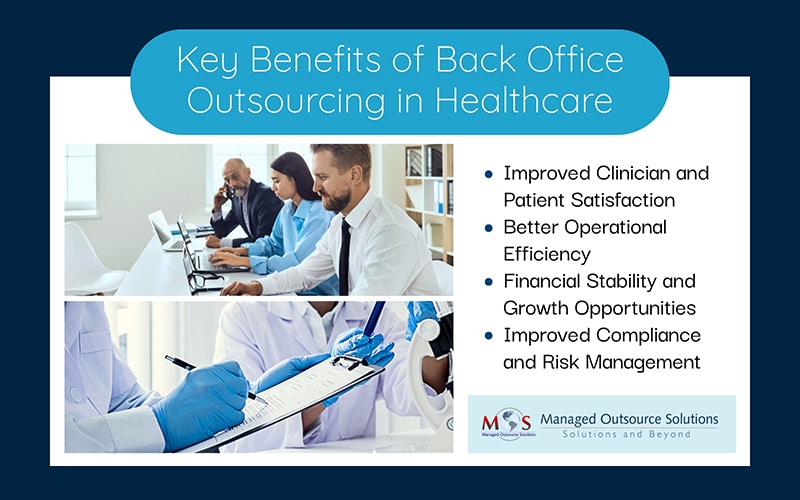Managing a healthcare facility today is no easy feat. Between rising patient expectations, evolving regulations, and staffing challenges, it’s easy for things to get overwhelming, especially on the administrative side. That’s where BPO outsourcing steps in as a game-changer. By leveraging healthcare back office outsourcing, hospitals, clinics, and private practices can lighten their administrative load and focus on delivering quality care. From billing and coding to HR and IT support, outsourcing these non-clinical tasks can dramatically improve efficiency, reduce costs, and help healthcare professionals spend more time doing what they do best, which is, caring for patients.
The Hidden Burden of Administrative Work
Behind every successful healthcare organization is a network of essential support tasks: documentation, revenue cycle management, billing, coding, scheduling, HR, and IT support. When clinicians and administrators are bogged down by paperwork and compliance responsibilities, it limits their time with patients and hinders overall performance.
A position paper by the American College of Physicians, titled “Patients Before Paperwork”, emphasized the urgent need to minimize administrative burden. Yet, many healthcare providers still face daily struggles with documentation, clinician recruitment, financial reporting, and compliance, all functions that fall under the back office umbrella. This is where outsourcing business processes becomes a transformative tool.
What Is Healthcare Back Office Outsourcing?
It involves delegating non-clinical, administrative operations to third-party service providers who specialize in healthcare administration. These services may include medical billing, coding, claims processing, patient data entry, payroll management, IT support, and HR tasks.
By outsourcing these responsibilities, hospitals and clinics can reduce overhead, increase accuracy, and allow clinical professionals to concentrate on what matters most—patient care.
Key Areas of Efficiency through Back Office Outsourcing
- Medical Billing and Coding
Outsourcing billing and coding ensures accurate documentation and faster reimbursements. Errors in billing often lead to claim denials, audits, or lost revenue. With trained professionals managing this process, hospitals gain precision and compliance with industry standards.
- Revenue Cycle Management
Handling everything from patient registration to collections, outsourced revenue cycle management accelerates cash flow, minimizes claim rejections, and improves overall financial health. With outsourced healthcare operations, organizations can automate and optimize their revenue streams.
- Human Resources and Staff Management
Tasks like onboarding, payroll, benefits administration, and compliance monitoring are time-consuming. By outsourcing HR functions, healthcare facilities improve employee satisfaction, reduce legal risks, and foster a supportive work environment.
- Finance and Accounting
Healthcare institutions benefit greatly from external financial advisors and back-office teams that handle accounts payable/receivable, financial reporting, and forecasting. This support enables better decision-making and promotes financial sustainability.
- IT and Cybersecurity
Maintaining up-to-date systems and protecting sensitive patient data is essential in healthcare. Outsourcing IT services ensures robust security, HIPAA compliance, and access to modern tools, all while reducing internal workload.
Strategic Benefits of Back Office Outsourcing in Healthcare
Outsourcing offers a strategic advantage for healthcare organizations aiming to improve efficiency and reduce costs. By delegating non-clinical tasks to specialized providers, healthcare facilities can streamline operations and focus more on delivering quality patient care.
- Improved Clinician and Patient Satisfaction
When clinicians are freed from excessive paperwork and compliance tasks, they can focus on delivering high-quality, compassionate care. Healthcare administrative support teams handle the backend work, resulting in improved job satisfaction, lower burnout rates, and better patient outcomes.
- Better Operational Efficiency
By partnering with experts, healthcare institutions can implement best practices across departments. Hospital back-end support services ensure seamless operations, reduced duplication of efforts, and faster turnaround times for essential processes.
- Financial Stability and Growth Opportunities
Outsourcing partners bring in cost efficiencies through economies of scale. Their ability to manage reimbursement, documentation, and coding with high accuracy ensures financial stability. This also supports expansion without overwhelming in-house teams.
- Improved Compliance and Risk Management
With changing regulations and frequent audits, compliance is critical. Outsourced partners stay up to date with evolving laws, minimizing the risk of penalties and ensuring that documentation and operations meet legal requirements.

Outsourcing doesn’t mean a loss of control, it means sharing the workload with a team of experts. One of the most effective ways to streamline operations in a modern healthcare setting is by embracing efficient healthcare administration through outsourcing partnerships. These strategic alliances not only reduce internal workload but also bring in industry-specific expertise, advanced technologies, and scalable solutions. Providers of outsourced support services for healthcare practices offer customized solutions based on need. Whether it’s temporary staffing, long-term documentation management, or project-based IT support, outsourcing allows flexibility and scalability.
The right BPO partner integrates with your internal workflows, aligns with your mission, and brings technological innovation to your processes. This integration is crucial for meeting the evolving demands of value-based care, patient satisfaction, and organizational growth.
Strategic healthcare BPO outsourcing isn’t just about reducing costs, it’s about working smarter. With the right partner, providers can build a more resilient, agile, and patient-focused healthcare system.




